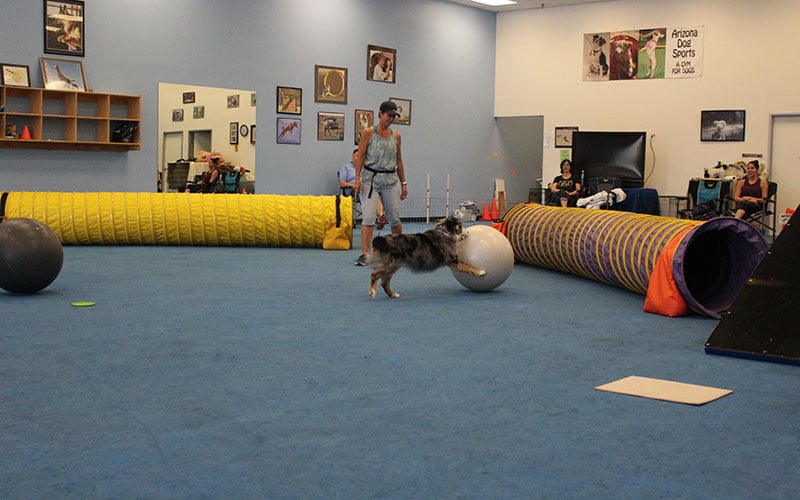
Denise Klaus’ dog Levi (center) wraps around the ball to push it into the goal. Treibball has a lot of intricacies so Bruner set up a modified version of the Treibball layout to help handlers and their dogs understand the basics. (Photo by Reinert Toft/Cronkite News)
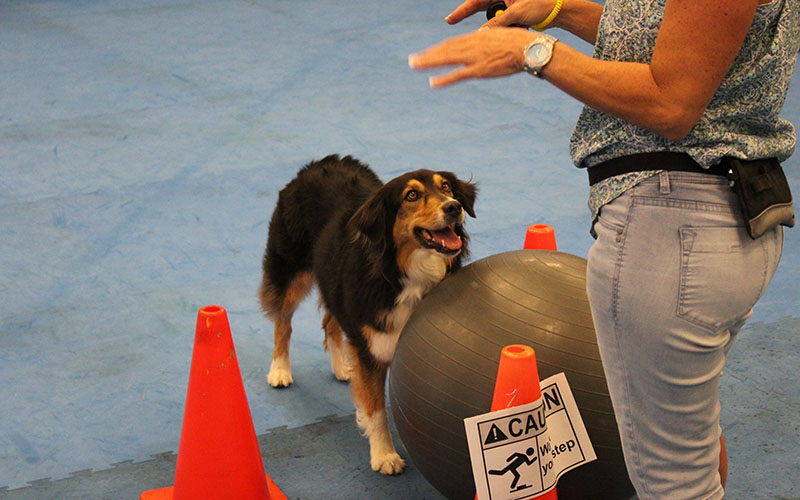
Denise Klaus (right), practices verbal commands with her dog Jolee (center). While Treibball focuses on the dogs, the sport has also had a positive impact on her. (Photo by Reinert Toft/Cronkite News)
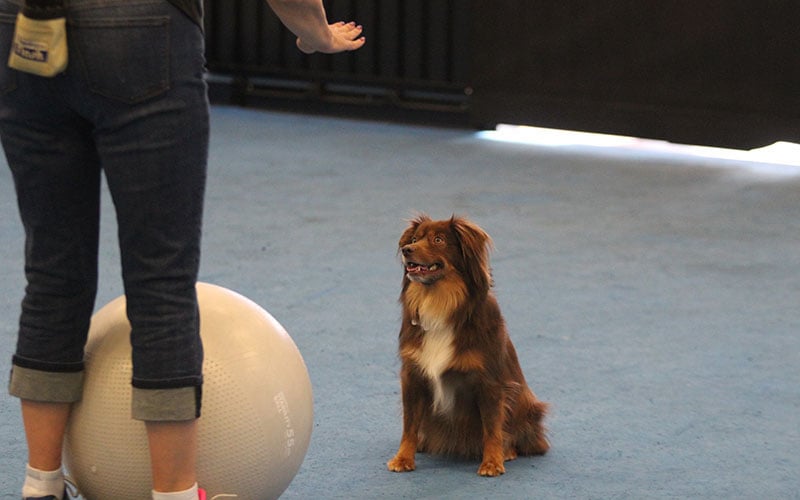
Bunny Hodas (left), practices with her dog Cooper (center). Hodas believes Treibball has helped improve Cooper’s impulse control both during Treibball practice and at home. (Photo by Reinert Toft/Cronkite News)
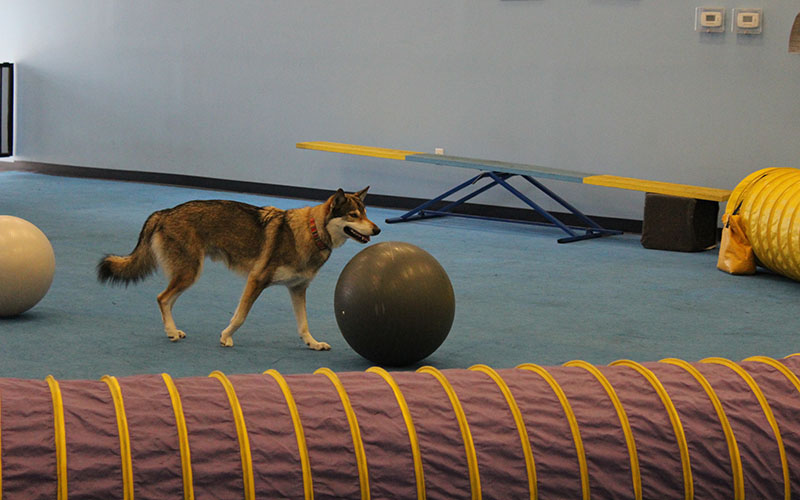
Hannalore Goodman’s dog, Odie, slowly pushes the ball towards the goal. While Treibball was originally made for herding breeds, Bruner has seen many other dogs become proficient in the sport. (Photo by Reinert Toft/Cronkite News)
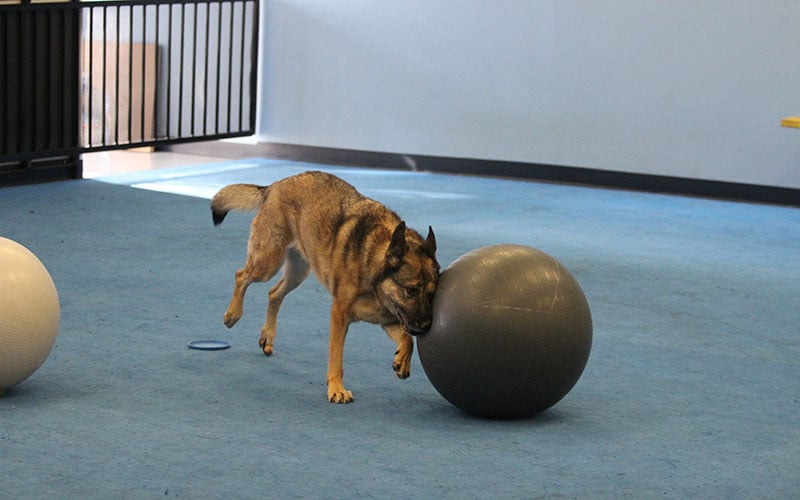
Will Bruner’s dog, Eloise, pushes one of the practice balls towards him. Bruner uses Eloise to teach the other handlers and their dogs techniques used in Treibball. (Photo by Reinert Toft/Cronkite News)
PHOENIX — In 2010, Will Bruner was working in Colorado when he saw a listing for an introductory class to Treibball. He was intrigued.
“It’s an interactive dog sport where the dogs use the same body movements and communication tools between dog and handler that they would in herding,” Bruner said.
That Treibball (pronounced tribe-ball) class in Colorado was the first to be held in the United States. Originally from Germany, the sport was developed specifically for herding breeds, but any dog can participate.
In the sport, fitness balls like those at a gym serve as “sheep.” The size of the ball depends on the size of the dog. The ball should come up to the dog’s shoulders.
The balls are set in a similar fashion to a game of pool. The handler must communicate with the dog to push balls into a goal, where the handler is standing. The dogs cannot bite the balls and carry them over, they can only move balls with their noses and chests.
“(Handlers) are allowed to give verbal commands,” Bruner said.
Depending on which class (beginner, intermediate, excellent, champion, honors) the handler and dog are competing in, the number of balls and the order in which the dog must bring the balls into the goal varies.
Once all the balls are in the goal, the handler must bring the dog to them and have them sit or lie down to signal that they have finished.
As a certified instructor and judge, Bruner holds Treibball classes at AZ Dog Sports in Phoenix. With all of its intricacies, Bruner sets up a modified version of the game to help handlers and their dogs understand the basic concepts.
“You have to teach them that you have to interact with the ball,” Bruner said. “And then they need to learn self-control because a lot of them want to play with the balls. Most dogs just want to punch it and bite it and chew on it and pretty quickly, they’ll pop the ball and the game is over.”
Dogs and their handlers who partake in Bruner’s Treibball classes have different levels of dog sport experience and they take the classes for various reasons.
Denise Klaus and her two Australian shepherds, Levi and Jolee, have had prior herding experience.
“Levi has had about two years of herding sheep and ducks, and Jolee has mostly worked sheep for maybe just a year, so they have a background,” Klaus said.
For Klaus, Treibball has had a positive impact on her relationship with Jolee.
“I would get frustrated with her because she wants to please me and when she gets stressed, she doesn’t understand yet what I’m asking,” Klaus said. “She would walk away from the sheep. This has allowed me. . . to not have as much disappointment in my voice because she’s very sensitive.”
Klaus said she and her dog are “a better team now.”
For Hannalore Goodman and her dog Odie, Treibball has a different purpose. Odie is a different dog at home than when playing Treibball, Goodman said. While excitable at home, Odie has a slow, methodical approach to Treibball.
Goodman is trying to get that out of him during Treibball class.
Bruner said the new dog sport is as much, if not more, of a mental workout than a physical workout for dogs.
“Dogs are high-thinking animals; they love things to be interesting,” Bruner said. “As much as they enjoy a good nap, when they are up and going, they want things to do and things to think about. So Treibball, just like any other dog sport, really works their body and their brain at the same time.”
Bruner said the number one thing he sees when the average person comes in with their dog, and the dog is struggling, is the lack of appropriate challenges in daily life.
Getting a dog mentally and physically exhausted in Treibball contributes to a better-behaved dog at home, where the dog is less likely to dig a hole in the yard or tear up a piece of furniture, Bruner said.
“(Treibball) teaches a lot of impulse control, so that can be a big part of it,” Bruner said.
For handler Bunny Hodas and her dog Cooper, Treibball has had that impact at home.
“I think that it’s helping,” Hodas said. “Cooper gets very excited, and it helps a lot with impulse control because he has to slow down and listen, and I’m seeing that reflected more at home.”
Training clinics for Treibball have popped up around the United States. Bruner has been teaching since 2015. Dog Central Station down in Tucson is the only other place in Arizona where Treibball classes are held.
Bruner hopes that once more people know about the sport, it will grow at a much faster rate.
“Just like any new sport, it takes a little while,” Bruner said. “You don’t see it a lot as televised events, and the American Treibball Association is trying to plan more events and host more people and get more people involved.
“Once (people) realize how much fun it is and how really their dog thinks and really works on focus, they get a lot more out of it.”